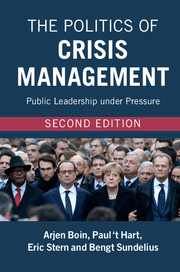Book contents
- Frontmatter
- Contents
- List of Figures
- List of Tables
- Introduction to the Second Edition
- 1 Managing Crises: Five Strategic Leadership Tasks
- 2 Sense Making: Grasping Crises as They Unfold
- 3 Decision Making and Coordinating: Shaping the Crisis Response
- 4 Meaning Making: Constructing a Crisis Narrative
- 5 Ending a Crisis: Managing Accountability
- 6 Learning and Changing: From Crisis to Reform
- 7 How to Deal with Crisis: Lessons for Prudent Leadership
- References
- Index
4 - Meaning Making: Constructing a Crisis Narrative
Published online by Cambridge University Press: 15 December 2016
- Frontmatter
- Contents
- List of Figures
- List of Tables
- Introduction to the Second Edition
- 1 Managing Crises: Five Strategic Leadership Tasks
- 2 Sense Making: Grasping Crises as They Unfold
- 3 Decision Making and Coordinating: Shaping the Crisis Response
- 4 Meaning Making: Constructing a Crisis Narrative
- 5 Ending a Crisis: Managing Accountability
- 6 Learning and Changing: From Crisis to Reform
- 7 How to Deal with Crisis: Lessons for Prudent Leadership
- References
- Index
Summary
The Politics of Crisis Communication
Swedish Minister of Foreign Affairs Laila Freivalds paid a high political price for her visit to the theater on the evening on December 26, 2004. The Asian tsunami disaster had killed hundreds of Swedes that very day. Her visit signaled an emotional dissociation from the fate of the 30,000 vacationing Swedes in the affected region. When the prime minister of the day, long-serving Goran Persson, backed her in blaming the government's tardy response on errors committed down the foreign service hierarchy, this did not play well. In early 2005 Persson faced hostile questioning from a parliamentary inquiry, which was broadcast around the nation. A highly critical report was issued, and the tsunami crisis dogged the government all the way until the next election, which it lost.
The charismatic and popular Australian police commissioner Christine Nixon saw her career cut short as a result of her perceived lack of involvement and empathy in times of crisis. During a public inquiry following the deadly “Black Saturday” bushfires on the outskirts of greater Melbourne in February 2009, it transpired that she and her husband had gone out for a pub meal with friends while communities were burning and people were dying. The public never forgave her. Nixon initially defended herself on the basis of fact: she had delegated command responsibilities for the bushfire response to a highly experienced assistant commissioner well before the situation became critical, and she had in fact been at the command center during most of the day before going off duty. It was to no avail. The tabloid press was merciless. Expert support for her conduct at the inquiry was not enough to undo the damage. She resigned in July 2010.
In a crisis, authorities can easily lose control, if only temporarily, over the dramaturgy of political communication. Overtaken by events, they struggle to formulate a message that offers an authoritative definition of the situation, provides hope, shows empathy for victims, and gives assurances that the authorities are doing their best to minimize the consequences of the threat. Leaders do not have much time to come up with such an authoritative take on events. Politicians, citizens, and other opinion makers, all making use of (social) media venues, offer competing interpretations and powerful images crafted for mass consumption.
- Type
- Chapter
- Information
- The Politics of Crisis ManagementPublic Leadership under Pressure, pp. 78 - 101Publisher: Cambridge University PressPrint publication year: 2016
- 2
- Cited by



